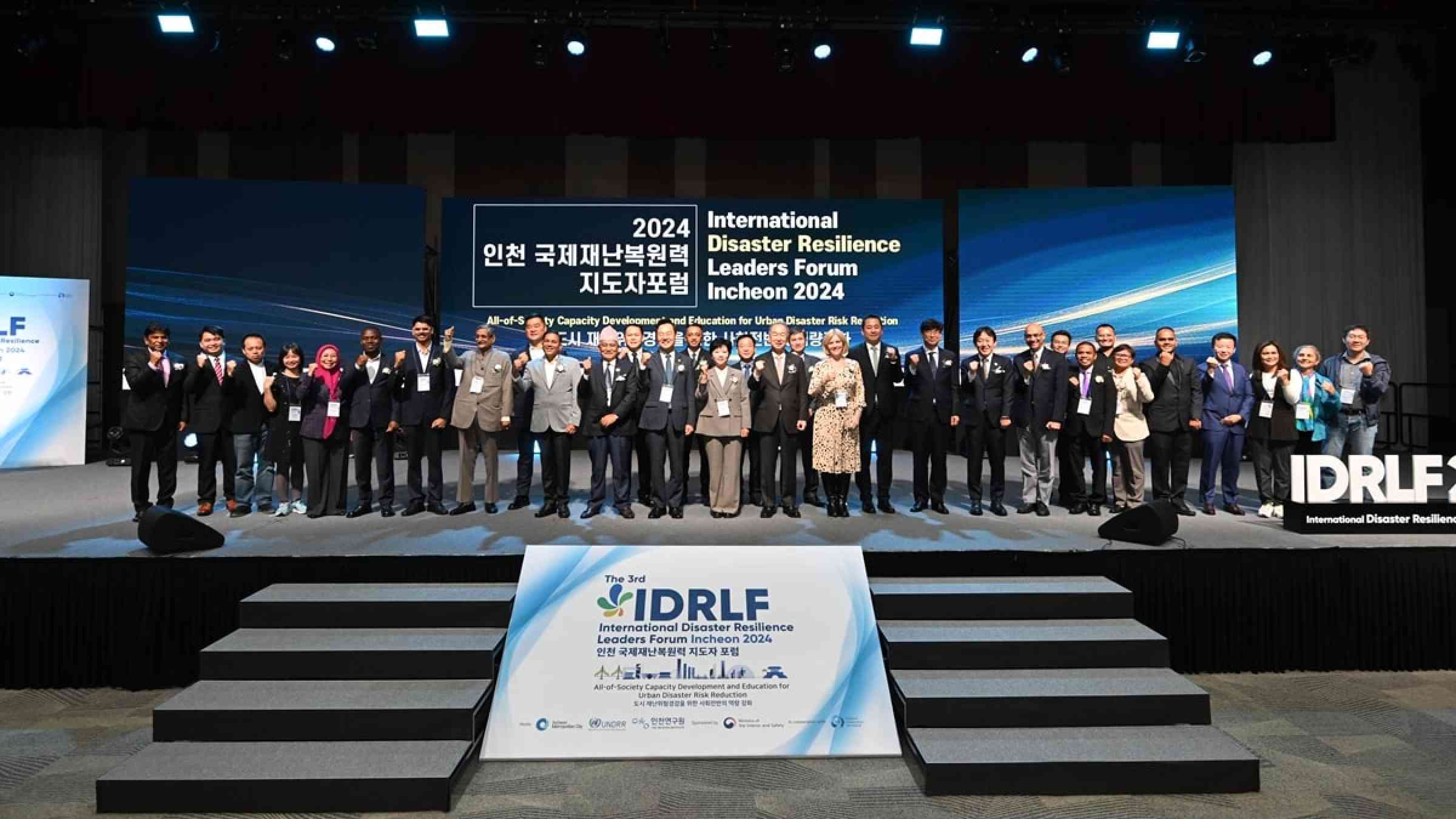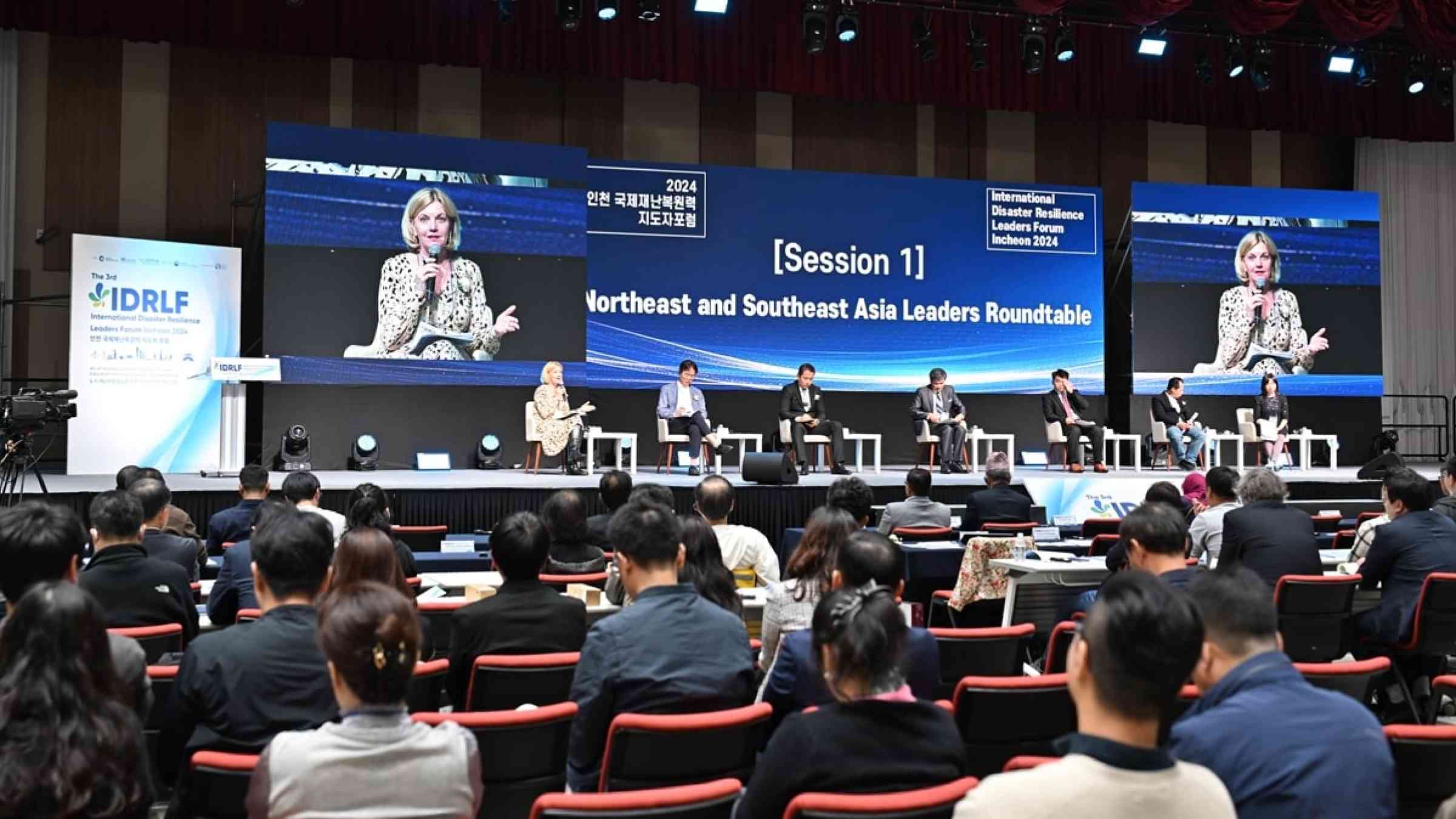Collaboration at the core of capacity building: International Disaster Resilience Leaders Forum 2024 Calls for United Efforts

At the 3rd International Disaster Resilience Leaders Forum Incheon 2024 (IDRLF 2024), global leaders reiterated a clear message: collaboration is the cornerstone for building local capacity to disaster resilience. Under the theme “All of Society Capacity Development and Education for Urban Disaster Risk Reduction,” speakers highlighted the need for collaboration with both local and international stakeholders across different levels.
“It is very important for cities around the world to work together to prepare response measures,” said Mr. Byoung-pil Ha, Vice Mayor for Administrative Affairs of Incheon Metropolitan City, host of the annual International Disaster Resilience Leaders Forum.
“The Incheon International Disaster Resilience Leaders Forum, now in its third year, is a place to enable diverse discussions and share knowledge to reduce the disaster risks we face and create safe cities”
- Mr. Byoung-pil Ha, Vice Mayor for Administrative Affairs of Incheon Metropolitan City
In his welcome address, Mr. Kamal Kishore, Special Representative of the United Nations Secretary General for Disaster Risk Reduction, underscored the timeliness of this year’s focus on capacity development.
“This year’s theme is especially important as we move into the last five years of implementing the Sendai Framework for Disaster Risk Reduction. Disaster resilience cannot be achieved without the engagement of all levels of government and society, and meaningful engagement requires adequate capacity development.”
- Mr. Kamal Kishore, Special Representative of the United Nations Secretary General for Disaster Risk Reduction
Ms. Loretta Hieber Girardet, Chief of UNDRR’s Risk Knowledge, Monitoring, and Capacity-Development Branch, underlined the critical need for local capacity building, noting, “The key message of this Forum is the importance to build capacity at the local level, as this is where the impact of disasters is most felt.”
Following the 2023 Midterm Review of the Sendai Framework for Disaster Risk Reduction 2015-2030, capacity development for resilience was recognized by the United Nations Member States as a key priority for the next few years, especially in developing countries. The 2024 IDRLF discussions explored capacity building needs at national, local and community level and showcased examples of effective capacity development initiatives implemented by governments and other stakeholders. The discussions emphasized the need for practical and multi-stakeholder efforts that enhance both institutional and individual resilience capacities.
Mayor Frederick W. Siao of Iligan City, Philippines, shared insights on the value and potential of partnerships to create impact.
“We have seen the devastation that disasters can cause, but we also witness the power of resilience through partnerships and collaboration. Let us continue to share our knowledge, leverage partnerships and drive innovation to make resilience a reality for all cities globally.”
- Mayor Frederick W. Siao of Iligan City, Philippines
A key part of the Forum’s agenda explored cross-sector support and capacity development at all societal levels. Cities shared their community-led disaster preparedness initiatives and capacity-building efforts at dedicated sessions for city networking, while representatives from academia and research institutions shared their thoughts on their role and research activities in supporting local government capacity building.
The critical role of DRR education to empower children and youth and build a culture of prevention was repeatedly cited by the Forum participants, with the Korean School Safety Programme showcased as an inspiring initiative that has benefited tens of thousands of students in the Republic of Korea and abroad.
“Embedding disaster risk reduction education in schools and higher education is essential to creating a culture of safety and preparedness”, said Mr. Santosh Kumar, Chief Executive Officer of the International Institute of Security and Safety Management, India, in his keynote speech. “By starting DRR education early, we can foster a generation that understands the importance of resilience and is better equipped to handle future challenges,” he stressed.
The Forum, co-organized by Incheon Metropolitan City, Incheon Institute and UNDRR ONEA & GETI with the support of the Ministry of the Interior and Safety of the Republic of Korea and in cooperation with the Trilateral Cooperation Secretariat, convened over 350 representatives from national and local governments, as well as leaders and experts in disaster risk reduction from Northeast Asia, Southeast Asia, and beyond.

The annual Forum is a flagship initiative of Incheon City as part of its commitments as a Resilience Hub under Making Cities Resilient 2030 (MCR2030) – a UN-led global collaboration of local governments and partners committed to urban disaster resilience.
The International Disaster Resilience Leaders Forum 2024 reaffirmed that an all-of-society capacity development approach, centered on collaboration, is crucial for advancing the Sendai Framework’s goals. As global leaders shared their insights and expertise, the underlying message was clear: fostering resilience requires shared knowledge, innovative partnerships, and a relentless commitment to capacity building for a safer, more resilient future.